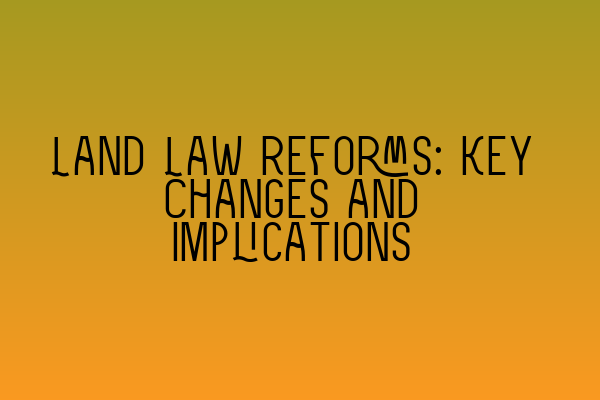**Land Law Reforms: Key Changes and Implications**
Welcome to the SQE Property Law & Land Law blog. In this post, we will discuss some of the key changes and implications of recent land law reforms. These reforms have significant implications for property owners, tenants, and legal professionals practicing in the field. So, whether you’re a solicitor, law student, or property enthusiast, this article is a must-read.
Before we dive into the details, make sure to check out our related articles on SQE 1 Practice Exam Questions, SQE 1 Practice Mocks FLK1 FLK2, SQE 2 Preparation Courses, and SQE 1 Preparation Courses. Also, if you’re preparing for the SRA SQE exam, be sure to stay updated with the latest SRA SQE Exam Dates.
Now, let’s get started with the key changes in land law and their implications.
**1. Land Registration Reform**
One of the most significant changes in land law is the reform in the land registration system. With this reform, there is a greater emphasis on the registration of title. As a result, it becomes crucial for property owners and legal professionals to ensure that all properties and transactions are properly registered. Failure to do so may lead to adverse possession claims or disputes over ownership.
The introduction of the digital conveyancing process, known as e-conveyancing, has also simplified and expedited the process of registering land. This digital transformation enables the electronic submission and processing of land registration applications, reducing the administrative burden and facilitating quicker property transactions.
**2. Leasehold Reforms**
Leasehold reforms have been long-awaited and aim to protect the rights of leaseholders and provide greater transparency in leasehold transactions. The reforms include measures to prohibit the sale of new leasehold houses, restrict ground rent charges, and simplify the process of extending lease terms.
These changes have far-reaching implications, not only for leaseholders but also for property developers and landlords. Legal professionals need to stay updated with the latest leasehold reforms to provide accurate advice on leasehold transactions, disputes, and lease extensions.
**3. Easements and Covenants**
The law regarding easements and covenants has also seen significant changes. The Supreme Court’s decision in the landmark case of ‘P&P Property Ltd v Owen White & Catlin LLP’ has clarified the requirements for acquiring easements by prescription. This case has set an important precedent for future claims of easements, making it essential for legal professionals and property owners to understand the updated legal principles.
Additionally, recent reforms have introduced stricter regulations regarding restrictive covenants. These changes aim to strike a balance between upholding the rights of landowners, while also ensuring the reasonable use and development of land. Legal professionals must be well-versed in these reforms to effectively advise clients and navigate potential disputes related to easements and covenants.
**4. Environmental Law and Property Transactions**
Environmental considerations have become increasingly important in property transactions. In recent years, there has been a growing focus on environmental sustainability, energy efficiency, and climate change mitigation. This has resulted in various regulations and requirements, such as energy performance certificates, pollution checks, and environmental impact assessments.
Legal professionals practicing in property law must be knowledgeable about environmental law and its impact on property transactions. Staying updated with the latest environmental regulations will enable solicitors to provide comprehensive advice to clients and ensure compliance with environmental standards.
In conclusion, the recent land law reforms have brought significant changes to the legal landscape of property transactions. Whether it’s the land registration reform, leasehold reforms, changes in easements and covenants, or the increasing emphasis on environmental considerations, these reforms have wide-ranging implications for legal professionals and property owners alike.
To stay ahead in the field of property law, it is essential for solicitors, law students, and property enthusiasts to keep themselves updated with the latest developments in land law. By attending SQE preparation courses and regularly engaging with practice exams and mock tests, you can sharpen your legal knowledge and skills.
If you found this article informative, don’t forget to explore our related articles on SQE exam preparation and important exam dates. Stay tuned for more updates on property law and land law reforms, and feel free to reach out to us for any legal assistance or queries.
